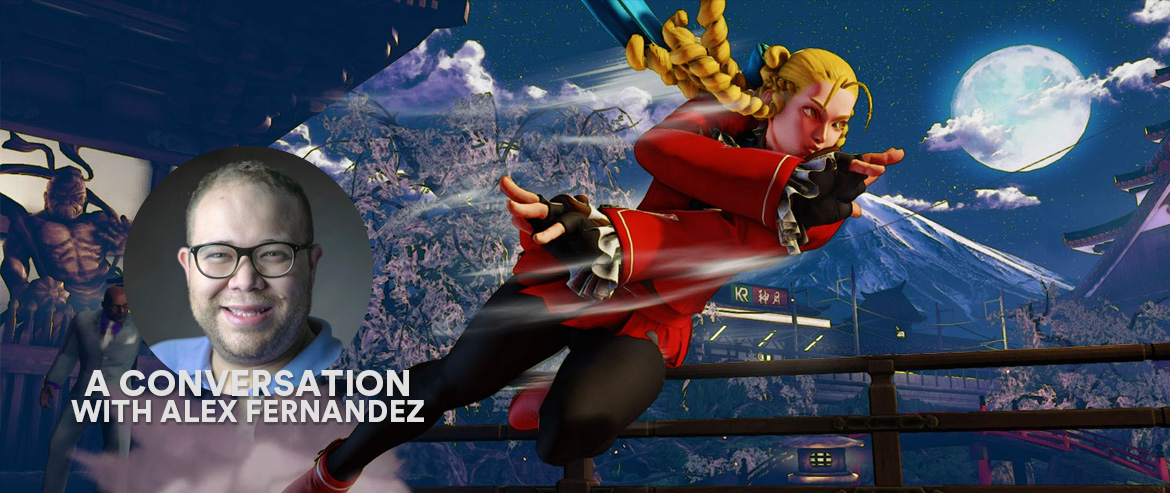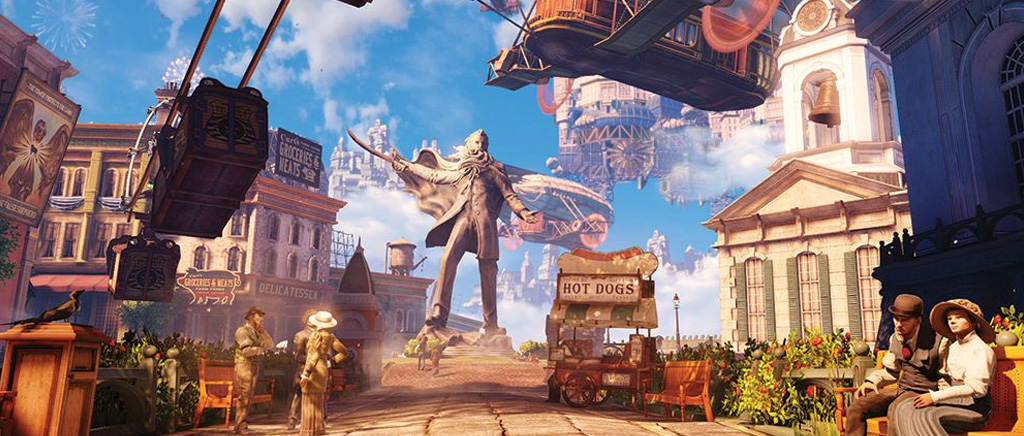Streamline Studios is an international videogame development company with office in the Netherlands, Malaysia, and the United States. The company has several original IPs and has assisted on large franchises including Street Fighter, BioShock, Gears of War, Saints Row, and more. As a Latino-American, company CEO and cofounder Alexander Fernandez has a unique perspective as an American that runs an international business. In the conversation below, Fernandez talks about Streamline, as well his company's stance on immigration situation in America that lead to this statement video.
Streamline Studios is a unique company in that you have your own IPs, but you also work with publishers on major franchise like BioShock and Street Fighter. Given your unique perspective, what are some of the trends you see coming in the next five years or so?
One of the things I think you'll see -- especially in console gaming -- are incremental updates to hardware. You'll see hardware moving towards a strategy that's almost like mobile phones. You'll have these in-between pieces of hardware that come out, ushering people through. Ultimately, with the advent of 4K, high-res graphics, and VR, we're going to be able to get more out of the incremental type of upgrade, but we'll also see content strategies that are multi-year. The concept of "what is a game?" and "what is a franchise?" will go from a release with some downloadable content to "this is a seven-year content strategy" or "this is a ten-year content strategy." That will reflect not only the power of the systems coming out, but also how publishers can monetize the games and how people can play these games differently.
This ties into what I think will happen in the mobile phone space. The power of your mobile phone right now, you basically have an Xbox 360 in an iPhone 7. Ultimately, we're going to see a PlayStation 4 or an Xbox One in a mobile phone. In that moment in time, the idea of what the difference is between triple-A mobile and triple-A console will start to melt away. We'll go into this open-play and open-access type of situation games will communicate multi-platform and multi-format. This will lead to a situation where it's truly about the experience of the product and the property itself than leveraging the actual hardware systems that the games are on. People will have access to the content they want on a variety of devices. It's going to be a fun time. It's going to be fantastic for gamers.
One of the unique products you offer to developers is Streamframe. For people not familiar with it. How would you describe it?
It's the world's first videogame production platform. It was built from the ground up to enable and allow remote development and distributed development. The tool itself brings down all the various aspects of managing the production process. The core is production and everything else that we do -- product management, client management, analysis, analytics, collaboration -- is built around it. What this allows you to do is take what's usually a very messy process called game development and put structure that allows you to funnel the creative energy of your people. At the same time, it allows you to maintain oversight and understand how much, how long, and who worked on what and when. It allows you to provide information to your external stakeholders and still be able to ride the rodeo. The tool itself was developed over 15 years. It's what we used to work with our customers around the world. It's something that came organically to meet the needs of production. That's the number-one thing. You have to solve production first. Once you've solved production, you can attach everything else and go from there.
We've used Streamframe around the world in over 200 productions. The system has been proven over the course of some very difficult productions. In the end, we're all looking for that one thing that can allow us to focus on making great games. Ultimately, it was built from our experience from growing from four guys in an apartment in Amsterdam to over 200 people in Kuala Lumpur.
In addition to Streamline being a unique company, you yourself have an interesting perspective as a Latino-American that operates a business with offices in the Netherlands, Malaysia, and America. A lot has been going on with immigration issues in America and I'd love to hear your perspective as an American that runs an international business.
For background, my mom is from Nicaragua, my dad is from El Salvador, and I grew up in the United States. I'm hispanic and basically lived firsthand the immigrant experience -- the illegal experience. I knew what it meant to grow up and not know what was going to happen in the outside world. All I knew what that I had to work my ass off and I had to work hard to try to survive. It's been a shame watching what's been happening with the entire immigration situation in the US. It's an embarrassment and moreover it's confusing because it goes against everything I was taught and everything I know to be true about the United States.
The hardest part about this is being an American overseas, having American values, and infusing those values into our business. It seems as though we've been saying something that's just not true, because we have someone that all of the sudden just says, "Terrorism. Threat to the homeland. Block Muslims." We come slamming down the shutters thinking that it's going to solve the problem when ultimately this has nothing to do with that. What the issues are, are so much greater to the country that this one thing seems like "let me go ahead and focus on the threat on the back of a t-shirt instead of the fact that t-shirts are being made wrong in the factory, but hey, let me go ahead and focus on this threat."
One of the things I find very difficult right now is that for the rest of the world looking outwards for American leadership, it's disappeared. There are vacuums being created and opportunities are being made for different countries to show their leadership. Meanwhile it looks like the US is scared of people that are "foreign." That's a shame, because our country has been built on immigration. It has been built on being inclusive. Right now, it looks like we're scared of just about everything.
It doesn't make any sense. From a business standpoint, what this means for us is that we have to go out there and help them understand what it means to work with people that are from these countries that are effectively banned. Additionally, there are countries like Mexico, which is now an "enemy." We're going to build a wall to protect ourselves, because bad people can't possibly get on a plane and fly over it or get on a boat. It's this type of thinking that doesn't make any sense. At the same time, I look at it right now and think that it's not easy being a minority. It's not easy being an immigrant. It's not easy being hispanic in the United States. What it comes down to is that you see what's happening in America and it just makes you wonder, what possible point could this have and how could it solve anything? In the games industry itself, which touches the lives of so many people around the world, our games influence millions of people in so many different cultures. If we didn't say anything in a loud voice or didn't talk about the immigration issue, our influence would be hollow. It would just take us back to be nothing more than a toy.
Our perspective on this as a company is that we cannot afford not to say something, because we do have people of 28 different nationalities, we are located in a Muslim country, we have Americans, I am an immigrant, and I'm hispanic for God's sake. I have all the negatives going against me, but at the same time let's not lose sight of what made the country great to begin with and what ultimately made the games industry great -- the fact that it doesn't matter where we're from. The knowledge we have and the skill of our craft, the talent and innovation the comes from the four corners of the world all come together in products that touch millions. If we can focus on that and discuss that in a way that's not childish, we'd have the voice we need to move forward. All of the organizations like the IGDA, GDC, and The Academy should be having these conversations, because we're asking all these people to participate, but some of us aren't even allowed into the country now. We have to do something.
Do you find it contradictory that a man that claims to want to "make America great again" is fighting against something that helped make America great in the first place?
Of course. He's pandering to a group of people that feel completely helpless or feel that it's other people's fault. If you want to make America great again then you have to go after the people that robbed America to begin with. It wasn't the immigrants that robbed America. The people that robbed America were the ones that had so much money -- the one percent -- that they could run off to foreign countries and avoid hiring people and investing, they could cut down on education, and they could cut on paying taxes. Then they want to go around and tell the constituents that it was the immigrants’ fault? That's pretty damn easy to say. In fact, the person that stole from you is sitting in a tower with his name on it.
You want to talk about taking away the immigrants? Let's talk about taking away the immigrants. Okay, there goes Apple. There goes Google. Gone. Even parts of Facebook are gone. Then let's talk about taking away the foreigners. There goes Sony. There goes Nintendo. What are we doing? It doesn't make any sense to me. You will not make America great by making it homogeneous. The greatness of America is diversity.
Return to Conversations index.





